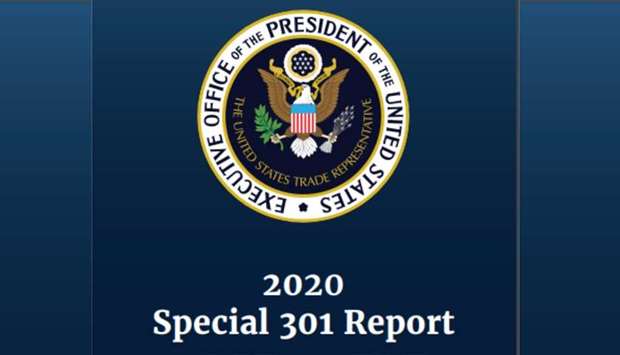*The Office of the United States Trade Representative places Saudi Arabia on its worst-offending IP black list, and also announces exceptional “Out-of-Cycle Review” for Saudi Arabia
The US government has published a scathing report that places Saudi Arabia on its “Priority Watch List”, related in large part to the rampant piracy spurred by beoutQ, while also exceptionally announcing an “Out-of-Cycle Review” into Saudi Arabia for its continued lack of intellectual property protection, beIN Media Group said in a statement released in Doha.
In what is another major governmental escalation in the beoutQ-related scandal and the lack of protection of world sport and entertainment bodies’ IP in and by Saudi Arabia, the United States Trade Representative (USTR) published its annual “2020 Special 301 Report” yesterday.
The report identifies Saudi Arabia as one of only 10 countries that fail to protect and enforce intellectual property around the world so as to merit inclusion on the Priority Watch List. The USTR also ordered an “Out-of-Cycle Review” into Saudi Arabia, one of only two countries, the beIN Media Group statement explained.
The US Government report follows only a few months after the European Commission also published a major report in which it singled out Saudi Arabia for “causing considerable harm to EU businesses” following the unprecedented theft of European sport programmes by Saudi-based beoutQ and Arabsat. As a result, increased focus will now be placed on the UK Government to support the UK’s most significant sports institution and global export – The Premier League – in light of the league’s unsuccessful attempts to appoint nine law firms in Saudi Arabia to seek legal justice against Saudi Arabia for the theft of its rights.
The USTR is part of the Executive Office of the US President, and the agency responsible for advancing United States trade policy and resolving disputes with countries that do not follow the rules of international trade agreements. Yesterday’s major report follows representations made over the past year by rights-holders, broadcasters and other stakeholders across the world of sport and entertainment.
In placing Saudi Arabia on its “Priority Watch List” for the second consecutive year, the USTR acknowledges that while beoutQ’s satellite operation on Arabsat has been down since August, IPTV piracy – fully available through the millions of beoutQ boxes – is the new scourge in the country.
The USTR report says: “The United States continues to remain concerned about reportedly high levels of online piracy in Saudi Arabia, particularly through illicit streaming devices (ISDs), which right holders report are widely available and generally unregulated in Saudi Arabia. The United States encourages Saudi Arabia to increase IP enforcement actions and IP awareness campaigns particularly targeted at reducing online piracy and to combat the perception spurred by beoutQ’s activity that pirating copyrighted material is permissible.” Before adding: “Right holders have expressed further concerns regarding effective civil enforcement of IP, including the ability to file civil actions, enforce judgments, and assess deterrent-level fines against infringers. Additionally, with regard to criminal enforcement of IP, right holders remain concerned that criminal sentences and financial penalties are not consistently imposed.”
In announcing an “Out-of-Cycle Review” into Saudi Arabia, the report says: “In 2020, USTR plans to conduct an Out-of-Cycle Review of Saudi Arabia…Out-of-Cycle Reviews focus on identified IP challenges in specific trading partner markets…failure to address identified IP concerns, or further deterioration as to an IP-related concern within the specified Out-of-Cycle Review period, can lead to an adverse change in status.”
In releasing the report, US Trade Representative Robert Lighthizer, said: “The Trump Administration is committed to holding intellectual property rights violators accountable and to ensuring that American innovators and creators have a full and fair opportunity to use and profit from their work. The two reports [including the Special 301 Report] illustrate the Administration’s commitment to protecting intellectual property rights and combating counterfeiting and piracy in online and physical markets.”

